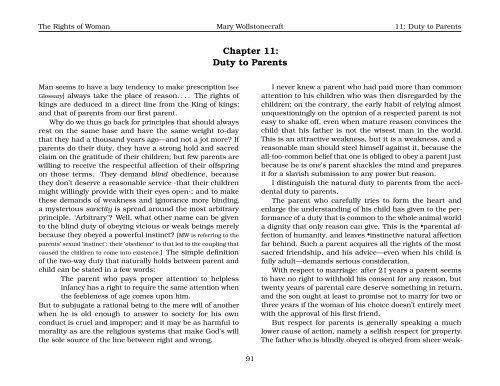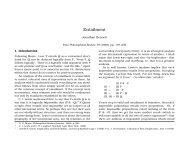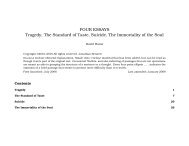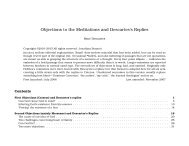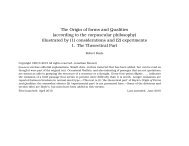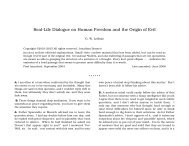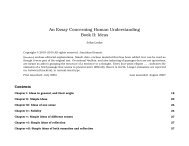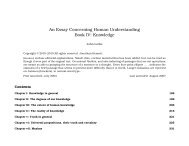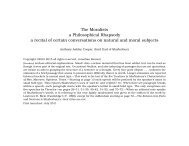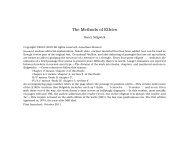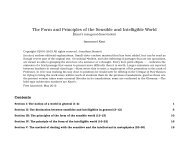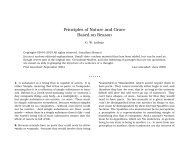A Vindication of the Rights of Woman with - Early Modern Texts
A Vindication of the Rights of Woman with - Early Modern Texts
A Vindication of the Rights of Woman with - Early Modern Texts
Create successful ePaper yourself
Turn your PDF publications into a flip-book with our unique Google optimized e-Paper software.
The <strong>Rights</strong> <strong>of</strong> <strong>Woman</strong> Mary Wollstonecraft 11: Duty to Parents<br />
Man seems to have a lazy tendency to make prescription [see<br />
Glossary] always take <strong>the</strong> place <strong>of</strong> reason. . . . The rights <strong>of</strong><br />
kings are deduced in a direct line from <strong>the</strong> King <strong>of</strong> kings;<br />
and that <strong>of</strong> parents from our first parent.<br />
Why do we thus go back for principles that should always<br />
rest on <strong>the</strong> same base and have <strong>the</strong> same weight to-day<br />
that <strong>the</strong>y had a thousand years ago—and not a jot more? If<br />
parents do <strong>the</strong>ir duty, <strong>the</strong>y have a strong hold and sacred<br />
claim on <strong>the</strong> gratitude <strong>of</strong> <strong>the</strong>ir children; but few parents are<br />
willing to receive <strong>the</strong> respectful affection <strong>of</strong> <strong>the</strong>ir <strong>of</strong>fspring<br />
on those terms. They demand blind obedience, because<br />
<strong>the</strong>y don’t deserve a reasonable service ·that <strong>the</strong>ir children<br />
might willingly provide <strong>with</strong> <strong>the</strong>ir eyes open·; and to make<br />
<strong>the</strong>se demands <strong>of</strong> weakness and ignorance more binding,<br />
a mysterious sanctity is spread around <strong>the</strong> most arbitrary<br />
principle. ‘Arbitrary’? Well, what o<strong>the</strong>r name can be given<br />
to <strong>the</strong> blind duty <strong>of</strong> obeying vicious or weak beings merely<br />
because <strong>the</strong>y obeyed a powerful instinct? [MW is referring to <strong>the</strong><br />
parents’ sexual ‘instinct’: <strong>the</strong>ir ‘obedience’ to that led to <strong>the</strong> coupling that<br />
caused <strong>the</strong> children to come into existence.] The simple definition<br />
<strong>of</strong> <strong>the</strong> two-way duty that naturally holds between parent and<br />
child can be stated in a few words:<br />
The parent who pays proper attention to helpless<br />
infancy has a right to require <strong>the</strong> same attention when<br />
<strong>the</strong> feebleness <strong>of</strong> age comes upon him.<br />
But to subjugate a rational being to <strong>the</strong> mere will <strong>of</strong> ano<strong>the</strong>r<br />
when he is old enough to answer to society for his own<br />
conduct is cruel and improper; and it may be as harmful to<br />
morality as are <strong>the</strong> religious systems that make God’s will<br />
<strong>the</strong> sole source <strong>of</strong> <strong>the</strong> line between right and wrong.<br />
Chapter 11:<br />
Duty to Parents<br />
91<br />
I never knew a parent who had paid more than common<br />
attention to his children who was <strong>the</strong>n disregarded by <strong>the</strong><br />
children; on <strong>the</strong> contrary, <strong>the</strong> early habit <strong>of</strong> relying almost<br />
unquestioningly on <strong>the</strong> opinion <strong>of</strong> a respected parent is not<br />
easy to shake <strong>of</strong>f, even when mature reason convinces <strong>the</strong><br />
child that his fa<strong>the</strong>r is not <strong>the</strong> wisest man in <strong>the</strong> world.<br />
This is an attractive weakness, but it is a weakness, and a<br />
reasonable man should steel himself against it, because <strong>the</strong><br />
all-too-common belief that one is obliged to obey a parent just<br />
because he is one’s parent shackles <strong>the</strong> mind and prepares<br />
it for a slavish submission to any power but reason.<br />
I distinguish <strong>the</strong> natural duty to parents from <strong>the</strong> accidental<br />
duty to parents.<br />
The parent who carefully tries to form <strong>the</strong> heart and<br />
enlarge <strong>the</strong> understanding <strong>of</strong> his child has given to <strong>the</strong> performance<br />
<strong>of</strong> a duty that is common to <strong>the</strong> whole animal world<br />
a dignity that only reason can give. This is <strong>the</strong> •parental affection<br />
<strong>of</strong> humanity, and leaves •instinctive natural affection<br />
far behind. Such a parent acquires all <strong>the</strong> rights <strong>of</strong> <strong>the</strong> most<br />
sacred friendship, and his advice—even when his child is<br />
fully adult—demands serious consideration.<br />
With respect to marriage: after 21 years a parent seems<br />
to have no right to <strong>with</strong>hold his consent for any reason, but<br />
twenty years <strong>of</strong> parental care deserve something in return,<br />
and <strong>the</strong> son ought at least to promise not to marry for two or<br />
three years if <strong>the</strong> woman <strong>of</strong> his choice doesn’t entirely meet<br />
<strong>with</strong> <strong>the</strong> approval <strong>of</strong> his first friend.<br />
But respect for parents is generally speaking a much<br />
lower cause <strong>of</strong> action, namely a selfish respect for property.<br />
The fa<strong>the</strong>r who is blindly obeyed is obeyed from sheer weak-


